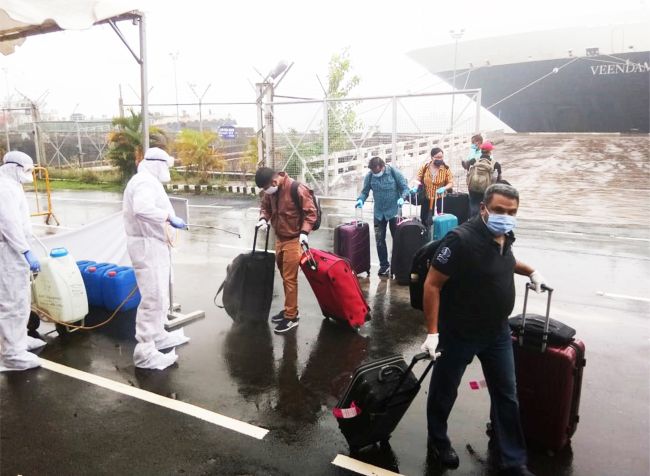IMO Member States meeting during an extraordinary session of the Maritime Safety Committee (MSC) has called on all Governments to take urgent action to resolve the humanitarian and safety crisis faced by the international shipping community as a result of the COVID-19 pandemic.
The Committee adopted a resolution on Recommended action to facilitate ship crew change, access to medical care, and seafarer travel during the COVID-19 pandemic, which urges specific action to address the issue, including designating seafarers as key workers with access to the necessary safe travel arrangements.
Speaking at the close of the session (21 September), which was held as a remote session, IMO Secretary-General Kitack Lim said, “This resolution should help ensure the integrity of employment and human rights of seafarers and, consequentially, minimize disruptions to global trade, supply chains, efficient operation of maritime transport and ensure the continued movement of food and livestock, products and essential goods by sea.”

Representation Image – Credits: GAC Group
“Seafarers can not remain at sea indefinitely, in addition to the humanitarian crisis that has been caused by keeping them effectively trapped on their vessels, the safety issues that arise from overly fatigued and mentally exhausted seafarers to continue operating vessels are a matter of great concern. If the crew change crisis is not resolved, ships will no longer be able to operate safely,” Mr. Lim said.
Mr. Lim also called on all Governments to consider raising the issue of seafarers and the crew change crisis during the high-level week of the 75th session of the United Nations General Assembly, beginning on 22 September 2020. An event to raise the visibility of the crew change crisis is being held on World Maritime Day on 24 September, bringing together the IMO, the International Labour Organization (ILO), the UN Global Compact, transport and maritime ministers and business leaders. (Information on the event here.)
”We must resolve this global crew change crisis as soon as possible, it is now time to row together, it is time for action,” Mr. Lim said.
More than 300,000 seafarers are currently stranded onboard ships, with some now having been working for more than 17 months at sea, without a break. A further 300,000 workers are unable to join ships and potentially face unemployment due to Government-imposed travel restrictions and quarantine measures in different parts of the world. The crisis threatens the well-being of seafarers and puts navigational safety in peril.
Business leaders are warning that the seafarer crisis could soon interrupt normal flows of international trade since more than 80% of goods including food, fuel, medical supplies are transported by sea.
MSC resolution – Recommended action to facilitate ship crew change, access to medical care and seafarer travel during the COVID-19 pandemic
The resolution expresses deep concern about the significant challenges being faced by the global shipping community to effect crew changes and repatriation of seafarers as a result of the COVID-19 pandemic, recognizing the crucial role of seafarers in supplying vital goods.
The resolution urges Governments and relevant national authorities to:
- Engage nationally and internationally in discussions on the implementation of the Recommended Framework of Protocols for Ensuring Safe Ship Crew Changes and Travel during the Coronavirus (COVID-19) pandemic (download here CL.4204/Add.14) and consider applying them to the maximum extent possible;
- designate seafarers as ʺkey workersʺ providing an essential service, in order to facilitate safe and unhindered movement for embarking or disembarking a vessel and consider legal possibilities for accepting internationally recognized documentation carried by seafarers as evidence of their status as ʺkey workersʺ, and for the purpose of their travel and movement for crew change;
- consider, in liaison with relevant ministries and authorities, including those responsible for immigration, temporary measures including (where possible under relevant law) waivers, exemptions or other relaxations from any visa or documentary requirements that might normally apply to seafarers;
- encourage the use of prevention measures, such as tests on crew before embarkation to reduce the risk of crew infections, with a view to facilitating safe and quick crew changes during the pandemic; and
- provide seafarers with immediate access to medical care, medical facilities and facilitate medical evacuation of seafarers in need of urgent medical attention when the required medical care cannot be provided either onboard or in the port of call; and address the situation of seafarers who, due to their unforeseen longer periods on board, are facing the expiration of essential medical prescriptions.
Governments and relevant national authorities are also invited to designate a National Focal Point on Crew Change and Repatriation of Seafarers, to coordinate action at national level.
Reference: imo.org













